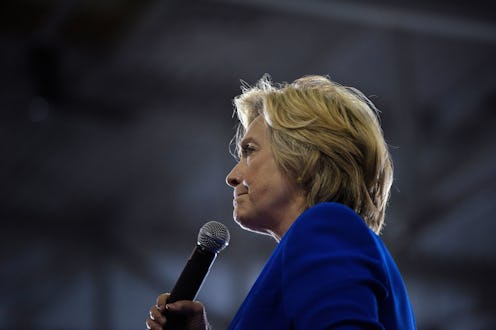News
Yes, Clinton’s “Penchant For Privacy” Is A Problem
On Sunday, news broke that Democratic presidential nominee Hillary Clinton is being treated for pneumonia, and it quickly enveloped the news cycle. Critics slammed Clinton — who was diagnosed on Friday, according to her doctor — for not immediately disclosing her illness. The news was particularly damaging to Clinton because it comes amid a number of conspiracy theories that she has a more severe illness, even brain damage from a 2012 concussion. However, such claims were refuted by Clinton's physician, who gave her a clean bill of overall health in 2015.
The resulting coverage was almost exclusively negative: Journalists wondered what would happen if Clinton had to drop out of the race; a bizarre trending hashtag on Twitter circulated a conspiracy theory that Clinton was replaced by a body double; and, most damningly, the Clinton campaign was heavily criticized for not announcing the pneumonia diagnosis earlier. The near-ubiquity of the negative coverage is startling, particularly considering, as comedian Patton Oswalt noted, that Clinton's campaigning with pneumonia could be alternatively be seen as pretty commendable. Oswalt tweeted, "Wait, so Hillary has PNEUMONIA and she's still campaigning as hard as she is? You realize how badass that is, right?"
Yet, that wasn't the story most reporters were telling.
This is just another way in which the Clinton campaign has completely lost control of the narrative of this election. I believe the campaign's inability to succinctly address Clinton's email server controversy contributed to what we saw at the NBC News Commander in Chief Forum, during which many of Clinton's few questions pertained to her emails instead of to her experience with international relations or policy preferences.
Most recently, she has been the subject of incessant criticism from the Trump campaign for the infrequency with which she holds press conferences. Her preference for privacy, while perhaps understandable given the intense personal scrutiny she faced during her husband's political career and her own, has become a distraction to her campaign and to the political issues she values. Vanity Fair calls Clinton's closest advisers a "tight-lipped human wall."
Certainly, some of Clinton's struggle to influence the narrative of this election season may be beyond her control. Her supporters have pointed out instances of alleged sexism frequently throughout her campaign; moreover, many studies have shown that women who succeed in male-dominated fields are seen as untrustworthy, selfish, and manipulative. Clinton herself acknowledged this rather directly in a posting on Humans of New York last week in which she acknowledged that she can be perceived as "walled off," "aloof," and "cold," describing an early experience when male students tried to intimidate her before she took the LSAT exam. Yet, if pneumonia can't incapacitate Clinton, neither should the sexism that tempts people to distrust successful women.
Former Obama administration adviser David Axelrod summarized some of Clinton's key weaknesses in a tweet Monday morning:
He's right. Clinton's famously guarded attitude toward the press has been distracting and detrimental to her campaign. Her refusal to hold a press conference for over 200 days derailed conversations about policy issues and made Clinton seem afraid of what the press would say.
In many ways, Clinton's suspicions about a "vast, right-wing conspiracy" way back in 1998 have become self-fulfilling. Withholding information (like her pneumonia diagnosis) and avoiding press conferences have made some voters suspect she truly does have something to hide. Clinton seems to feel that more openness with the press will make her more susceptible to criticism; in reality, her "penchant for privacy," as Axelrod called it, is doing more damage than any reporter.
